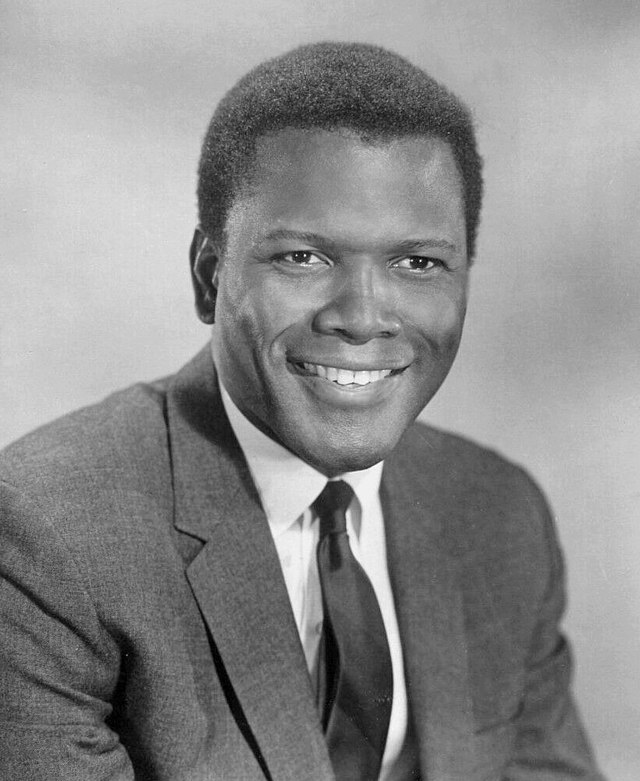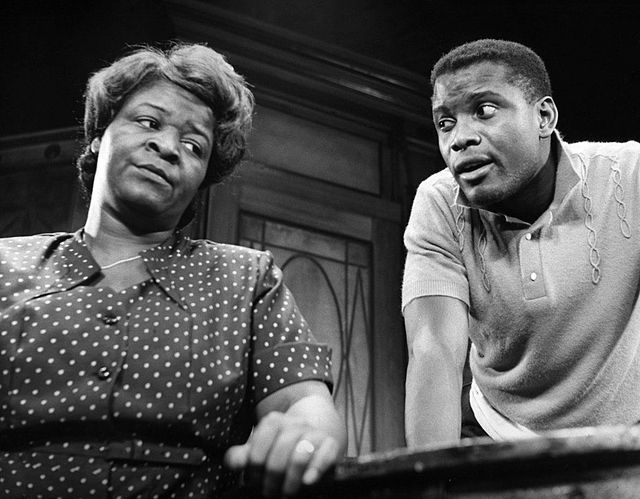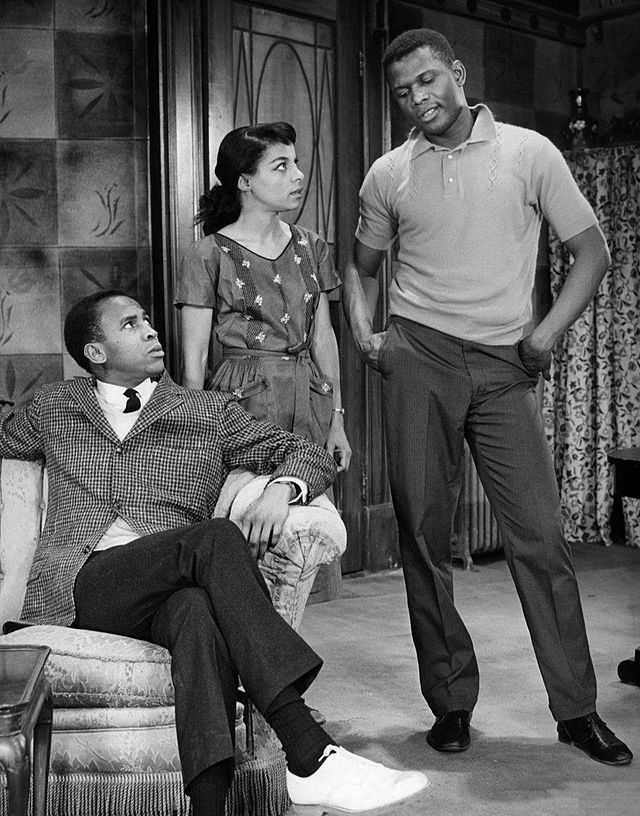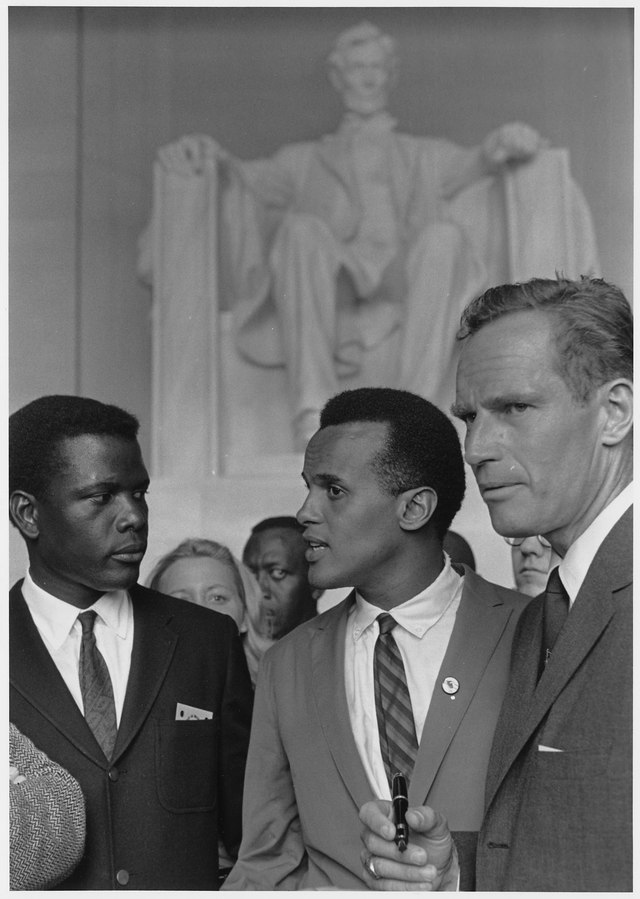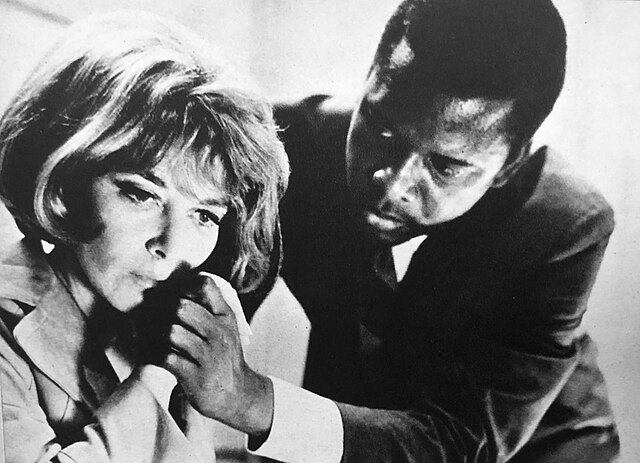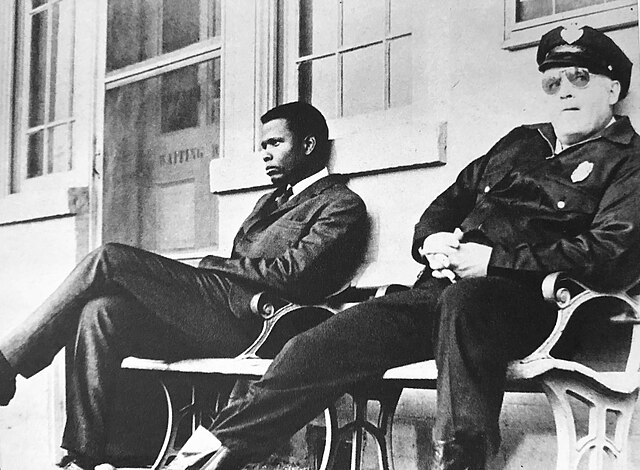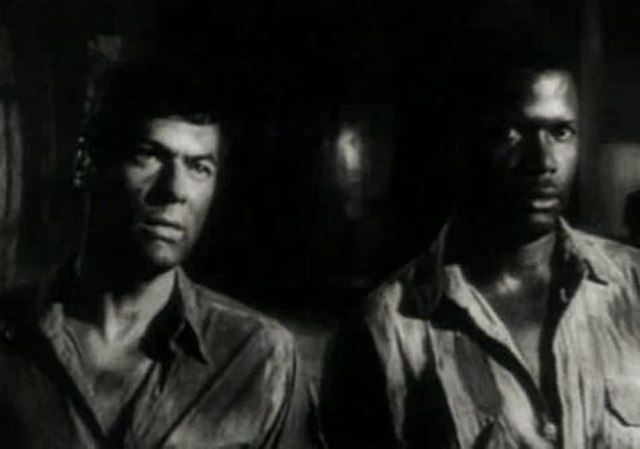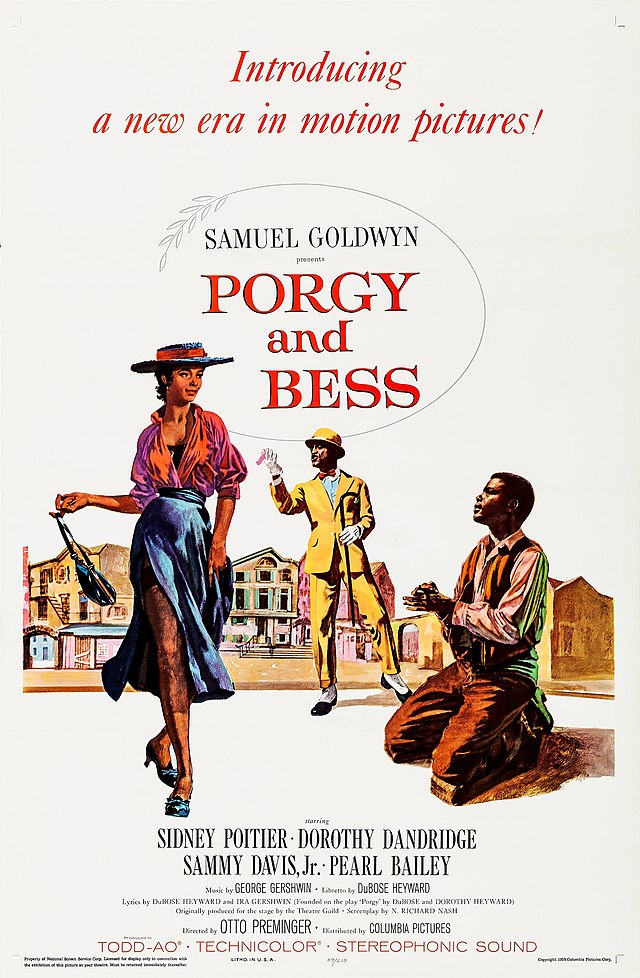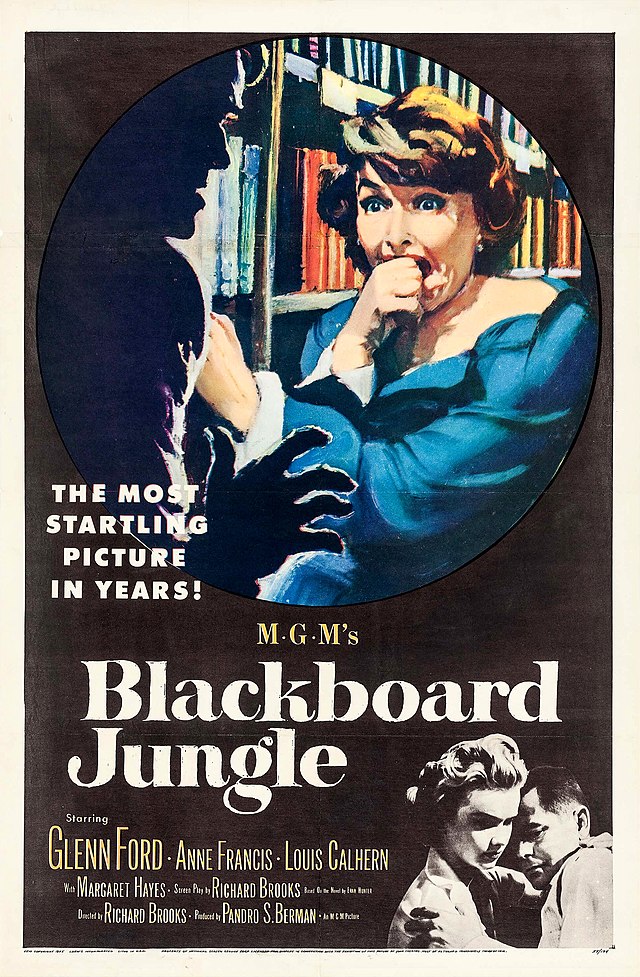Sidney Poitier
back| Full Name | Sidney L. Poitier |
| Stage Name | Sidney Poitier |
| Born | February 20, 1927 |
| Birthplace | Miami, Florida, USA (though he was raised in Cat Island, Bahamas) |
| Died | January 6, 2022 |
| Buried | Not publicly disclosed |
| Married to | Juanita Hardy (m. 1950; div. 1965) - Joanna Shimkus (m. 1976 until his death in 2022) |
| Children | Beverly Poitier-Henderson - Pamela Poitier - Sherri Poitier - Gina Poitier (deceased in 2018) - Anika Poitier - Sydney Tamiia Poitier |
| Notable films | No Way Out (1950) - Blackboard Jungle (1955) - Porgy and Bess (1959) - Guess Who's Coming to Dinner (1967) - In the HEat of the Night (1967) - The Bedford Incident (1965) |
Sidney Poitier
The Trailblazer
Sidney Poitier was a trailblazer in Hollywood, becoming the first Black actor to win the Academy Award for Best Actor and paving the way for African-Americans in the film industry. Born prematurely in Miami while his Bahamian parents were visiting, Poitier grew up on Cat Island in the Bahamas before moving to the United States in his early teens.
Poitier's career breakthrough came with "No Way Out" in 1950, and throughout the 1950s and 1960s, he became known for his powerful and dignified performances, often playing characters that dealt with issues of race and social justice. His role in "Lilies of the Field" won him the Academy Award, solidifying his place in cinema history.
Related
Sidney Poitier (1927 – 2022)
Biography and Movie Career:
Sidney L. Poitier was born on February 20, 1927, in Miami, Florida, during a visit his Bahamian parents made to the United States. His father, Reginald James Poitier, was a tomato farmer, and his mother, Evelyn (née Outten), was a homemaker. Poitier was born two months prematurely, and his parents did not expect him to survive. His early arrival into the world was marked by hardship and uncertainty, which foreshadowed the resilience and determination that would define his life.
Though born in the United States, Poitier spent his early years on Cat Island, a small and isolated part of the Bahamas. He grew up in a rural, close-knit community with limited access to modern amenities. His early childhood was shaped by simplicity and the natural surroundings of island life. At age 10, his family moved to Nassau, the capital of the Bahamas, seeking better opportunities. It was there that Poitier first encountered the broader world, experiencing life beyond the confines of Cat Island.
At 15, Poitier was sent to live with his older brother Cyril in Miami, hoping for a better future. It was a culture shock for the young Poitier, who faced the harsh realities of racial segregation and discrimination for the first time. Shortly afterward, he moved to New York City, drawn by the allure of the big city and the possibility of new beginnings. He arrived with just three dollars in his pocket, little education, and a strong Bahamian accent that made him hard to understand.
Path to Success
In New York, Poitier took on a series of menial jobs, working as a dishwasher and struggling to make ends meet. A turning point came when he saw a newspaper advertisement for actors by the American Negro Theater. Poitier, intrigued by the idea of acting, auditioned but was rejected due to his thick accent and poor reading skills. Undeterred, he worked diligently to improve his diction and learn American English by listening to radio broadcasts. His persistence paid off, and he was eventually accepted into the theater group, albeit in a janitorial capacity initially.
Poitier's break came when an actor fell ill, and he was asked to step in for a role. His performance caught the attention of the theater community, leading to more opportunities on stage. He soon made his Broadway debut in "Lysistrata" and was noticed by film executives. His film career began with "No Way Out" (1950), where he played a doctor treating a racist white patient. The film's success and his compelling performance paved the way for more roles in Hollywood.
During the 1950s and 1960s, Poitier became a symbol of dignity and grace in cinema, often portraying characters that confronted racial prejudices. He made history in 1958 with his role in "The Defiant Ones," earning an Academy Award nomination for Best Actor, a first for a black actor. His role in "A Raisin in the Sun" (1961) brought critical acclaim, as he reprised his role from the Broadway production.
Poitier's most groundbreaking achievement came in 1963 with "Lilies of the Field." His portrayal of Homer Smith, an itinerant handyman who helps a group of nuns build a chapel, won him the Academy Award for Best Actor, making him the first African American to win this prestigious honor. This milestone established Poitier as a trailblazer and a major box office draw.
Film Highlights and Career
The 1960s were a golden era for Poitier, marked by several iconic films that defined his career and solidified his status as a leading man. In "Guess Who's Coming to Dinner" (1967), he starred alongside Spencer Tracy and Katharine Hepburn in a film that addressed interracial marriage, a controversial topic at the time. That same year, he appeared in "In the Heat of the Night," playing Virgil Tibbs, a black detective who faces racism while solving a murder in a small Southern town. The film won the Academy Award for Best Picture and featured the now-famous line, "They call me Mister Tibbs!"
In "To Sir, with Love" (1967), Poitier portrayed a teacher who earns the respect of his rebellious students at a tough London school. His roles during this period highlighted his versatility and ability to navigate complex social issues through his performances. Poitier's presence on screen challenged the racial stereotypes prevalent in Hollywood, presenting a new image of African Americans that was both dignified and powerful.
In addition to acting, Poitier took an interest in directing, marking his directorial debut with "Buck and the Preacher" (1972), a Western starring Poitier and Harry Belafonte. He followed this with a string of successful comedies, including "Uptown Saturday Night" (1974) and "Let's Do It Again" (1975), both of which featured Bill Cosby. Poitier's work behind the camera demonstrated his keen sense of storytelling and ability to entertain audiences.
Personal Life and Marriages
Sidney Poitier's personal life was as eventful as his career. He married his first wife, Juanita Hardy, in 1950. The couple had four daughters together: Beverly, Pamela, Sherri, and Gina. Poitier's career demands and personal issues led to the end of his marriage with Hardy, and they divorced in 1965. Poitier also had a nine-year extramarital relationship with actress Diahann Carroll during this time.
In 1976, Poitier married Canadian actress Joanna Shimkus, with whom he shared a loving and enduring partnership. The couple had two daughters, Anika and Sydney Tamiia, both of whom pursued careers in the arts. Poitier and Shimkus remained married until his death, exemplifying a strong and supportive relationship. His daughters have often spoken about his role as a devoted and loving father, instilling values of integrity, respect, and perseverance.
Passions and Achievements Beyond Film
Beyond his work in film, Sidney Poitier was deeply passionate about civil rights and social justice. He was a close friend of Martin Luther King Jr. and participated in the March on Washington in 1963. His roles in film often mirrored his real-life commitment to challenging racial injustices and promoting equality. Poitier's influence extended beyond Hollywood, as he became an important cultural figure and advocate for change.
Poitier was also an accomplished writer, authoring several books, including his autobiography, "This Life" (1980), and the spiritual reflection "The Measure of a Man: A Spiritual Autobiography" (2000), which became a bestseller and was selected for Oprah Winfrey's Book Club. His writings provided insight into his thoughts on life, faith, and the pursuit of excellence.
In 1974, Poitier was knighted by Queen Elizabeth II as Knight Commander of the Order of the British Empire (KBE), recognizing his contributions to the arts. In 2009, President Barack Obama awarded him the Presidential Medal of Freedom, the highest civilian honor in the United States, celebrating his trailblazing career and dedication to advancing civil rights.
In addition to his acting and directing accomplishments, Poitier served as the Bahamian ambassador to Japan and UNESCO, illustrating his commitment to diplomacy and international relations.
Later Years and Death
In his later years, Poitier retired from acting, choosing to focus on his family and other interests. Despite his absence from the screen, his legacy continued to inspire new generations of actors, filmmakers, and activists. He received numerous lifetime achievement awards, including an honorary Oscar in 2002, celebrating his monumental impact on the film industry and his role in breaking racial barriers.
Sidney Poitier passed away on January 6, 2022, at the age of 94. His death marked the end of an era for Hollywood and the world at large. The cause of death was not publicly disclosed, but it was reported that Poitier had been in declining health for some time. His passing prompted an outpouring of tributes from fellow actors, public figures, and fans worldwide, all honoring his remarkable life and achievements.
Poitier's legacy is one of courage, grace, and dignity. He reshaped the landscape of American cinema and opened doors for countless actors of color. His life story is a testament to the power of perseverance and the impact one individual can have on changing the course of history. Sidney Poitier will forever be remembered as a pioneer, a gentleman, and a true icon of the silver screen.
Sidney Poitier receiving an Honorary Award in 2022:
Dignified Acting Style of Sidney Poitier:
Sidney Poitier's acting style is widely recognized for its powerful combination of dignity, grace, and intensity. His performances are marked by a subtle yet commanding presence that allowed him to convey deep emotions and complex characterizations without resorting to melodrama or theatricality.
Dignified Presence and Poise
One of the most distinctive features of Poitier's acting was his dignified presence. Poitier brought a sense of poise and integrity to his roles, often playing characters who stood up against injustice and racial prejudice. His body language, posture, and deliberate movements conveyed a calm, collected demeanor, which helped to communicate his characters' inner strength and moral conviction. This dignified presence allowed Poitier to portray characters who were often underrepresented in Hollywood: black men who were intelligent, articulate, and moral.
In films like "Guess Who's Coming to Dinner" and "In the Heat of the Night," Poitier's characters exude confidence and self-respect, even when facing intense scrutiny or hostility. His ability to maintain composure in the face of adversity became a hallmark of his performances, making him a powerful symbol of resilience and pride for audiences, particularly African Americans.
Controlled Emotional Expression
Poitier's acting was characterized by a controlled and measured approach to emotional expression. He was adept at conveying deep feelings through subtle facial expressions and vocal inflections rather than overt displays of emotion. This restraint made his moments of emotional outburst or confrontation all the more impactful, as they were often the culmination of a slow build-up of tension.
For example, in "A Raisin in the Sun," Poitier's portrayal of Walter Lee Younger is a masterclass in controlled emotional expression. Throughout the film, Walter's frustration and anger simmer beneath the surface, only occasionally erupting into powerful, passionate monologues. Poitier's ability to oscillate between quiet introspection and explosive anger gave his character a dynamic range, making his performance compelling and relatable.
Nuanced Portrayal of Inner Conflict
Poitier excelled at portraying characters grappling with internal conflicts and moral dilemmas. His performances often conveyed a sense of introspection, as his characters weighed their personal desires against societal expectations or moral imperatives. This ability to depict nuanced internal struggles added depth to his roles, allowing audiences to see the complexity of his characters' experiences.
In "The Defiant Ones," for instance, Poitier's character, Noah Cullen, is a black convict chained to a white prisoner, played by Tony Curtis. The film explores themes of racial prejudice and mutual dependence. Poitier's portrayal captures Cullen's initial distrust and resentment, gradually shifting to an understanding of their shared humanity. His performance is marked by a careful balance between aggression and vulnerability, making his character's transformation believable and emotionally resonant.
Mastery of Dialogue and Articulation
Poitier's mastery of dialogue was another key element of his acting style. His background in theater likely contributed to his exceptional diction and articulation, which he used to great effect in his film roles. Poitier's clear and deliberate speech lent authority to his characters, enhancing their credibility and the impact of their words. His ability to deliver lines with precision and emotional weight made his performances memorable and quotable.
A notable example of this is Poitier's line in "In the Heat of the Night," where his character, Virgil Tibbs, asserts, "They call me Mister Tibbs!" The line, delivered with firm conviction, not only becomes a powerful moment in the film but also serves as a statement of self-respect and demand for equality. Poitier's skillful delivery of dialogue allowed him to make such moments iconic.
Subtlety and Understatement
Poitier's acting style was often marked by subtlety and understatement, allowing him to convey powerful messages without resorting to overt dramatics. He had a keen sense of when to hold back, using small gestures, eye contact, and silence to communicate his character's thoughts and feelings. This understated approach drew audiences into his performances, encouraging them to engage with the character's inner life.
In "To Sir, with Love," Poitier's portrayal of Mark Thackeray, a teacher dealing with unruly students, showcases his subtlety. He uses gentle persuasion, quiet authority, and moments of silence to command respect and connect with his students. His understated approach makes his eventual breakthrough with the class feel authentic and earned.
Breaking Stereotypes and Challenging Norms
Poitier's acting was instrumental in challenging Hollywood's stereotypical portrayal of black characters. He often chose roles that depicted black men in a positive light, as individuals of integrity, intelligence, and moral courage. By portraying characters who were doctors, detectives, and teachers, Poitier offered a new representation of blackness on screen, one that countered the prevalent racial stereotypes of the time.
His role in "Lilies of the Field," where he plays Homer Smith, a handyman who helps a group of nuns build a chapel, exemplifies this. Poitier's character is depicted as a capable, kind-hearted individual, driven by a sense of purpose and community. His portrayal is free from the caricatures that often defined black characters in Hollywood, making him a trailblazer in the industry.
Versatility Across Genres
While Poitier is often associated with socially conscious dramas, his versatility allowed him to excel across different genres, including comedy, romance, and action. His ability to adapt his acting style to suit various types of stories demonstrated his range as an actor. Whether in the comedic roles of "Uptown Saturday Night" or the action-packed "Shoot to Kill," Poitier brought the same level of commitment and authenticity to his performances.
Sidney Poitier's acting style was a blend of dignity, subtlety, and emotional depth. His ability to convey complex characters with grace and strength made him a pioneering figure in Hollywood. Poitier's performances were not just about entertainment; they were about making statements, breaking barriers, and advancing the representation of black people in cinema. His legacy as an actor is not only defined by the roles he played but also by the broader cultural impact of his work, paving the way for future generations of actors to follow in his footsteps.
Quotes from Sidney Poitier:
idney Poitier was known not only for his remarkable performances but also for his insightful and inspiring words. Here are some memorable quotes from Sidney Poitier that reflect his wisdom, views on life, career, and social justice:
Quotes on Acting and Career
- "I never had an occasion to question color, therefore, I only saw myself as what I was... a human being."
Poitier often emphasized that he saw himself first and foremost as a human being, highlighting his belief in universal humanity and dignity.
- "I had chosen to use my work as a reflection of my values."
Poitier was selective about the roles he took, aiming to portray characters that aligned with his values of integrity, respect, and moral fortitude.
- "I felt very much as if I was representing 15, 18 million people with every move I made."
As a trailblazer for African-American actors, Poitier recognized the weight of his responsibility and the importance of his roles in representing his community.
- "If I'm remembered for having done a few good things, and if my presence here has sparked some good energies, that's plenty."
Poitier remained humble about his legacy, focusing on the positive impact his work and life could have on others.
- "I've learned that I must find positive outlets for anger or it will destroy me. A man who is not in control of his temper is a slave to himself."
This quote reflects Poitier's belief in self-control and finding constructive ways to deal with challenging emotions.
Quotes on Life and Philosophy
- "I decided in my life that I would do nothing that did not reflect positively on my father's life."
Poitier often spoke about the influence of his upbringing and the values instilled in him by his father, guiding his life choices and career.
- "Forgiveness works two ways, in most instances. People have to forgive themselves too. The powerful words, 'I am sorry,' are seldom said. They are seldom heard. But when they are, they have the ability to forge friendships that can last a lifetime."
Poitier emphasized the power of forgiveness in healing and building lasting relationships.
- "I always wanted to be someone better the next day than I was the day before."
This quote encapsulates Poitier's philosophy of continuous self-improvement and striving to be a better person.
- "We all suffer, and we all triumph, and we all get through it."
Acknowledging the universal nature of human experience, Poitier recognized that everyone faces struggles but also has the capacity for resilience and success.
- "You don’t have to become something you’re not to be better than you were."
Poitier believed in authenticity and personal growth without compromising one's true self.
Quotes on Race and Social Justice
- "I was the only black person in my school. No teacher ever spoke to me. I had no friends. I had no friends until I left there."
Reflecting on his experiences with racism and isolation, Poitier shed light on the challenges he faced growing up in a segregated society.
- "I knew we had the potential to be what we finally became."
Poitier believed in the potential of African Americans to achieve greatness despite the limitations imposed by society.
- "So much of life, it seems to me, is determined by pure randomness."
Poitier acknowledged the role of chance in life’s outcomes, suggesting that much is beyond our control.
- "I am not a quitter. I will fight until I drop. It’s just a matter of having some faith in the fact that I will fight until I drop."
This quote captures Poitier's determination and fighting spirit in the face of adversity.
- "I’ve learned that I must find positive outlets for anger or it will destroy me. A man who is not in control of his temper is a slave to himself."
Poitier spoke about the importance of channeling emotions constructively to maintain self-control and integrity.
Quotes on Legacy and Influence
- "I had faith in myself, and I was lucky to be born at a time when the culture embraced what I had to offer."
Poitier recognized the serendipity of his success and the broader cultural shifts that allowed him to make a significant impact.
- "I am the me I choose to be."
This simple yet profound statement reflects Poitier's belief in personal agency and the power of choice in defining one's identity.
- "I am not a hero. I am a man. A man who has tried to do what he thought was right."
Poitier remained grounded, viewing himself not as a hero but as a man guided by his principles.
- "The journey has been incredible from its beginning."
Reflecting on his life, Poitier recognized the remarkable journey he had taken, filled with challenges, triumphs, and lasting contributions.
- "I have learned that I must find positive outlets for anger or it will destroy me."
This introspective quote highlights Poitier's approach to handling life's challenges with grace and finding ways to transform negative emotions into positive action.
Relationship between Sidney Poitier and Diahann Carroll
Sidney Poitier and Diahann Carroll, both iconic figures in the entertainment industry, shared a complex and significant personal relationship during the 1960s.
Relationship Overview
- Meeting and Initial Connection:
Sidney Poitier and Diahann Carroll first met in the late 1950s. Both were trailblazers in Hollywood, breaking racial barriers and stereotypes in the film and television industries. They were both married to other people when they met: Poitier was married to Juanita Hardy, and Carroll was married to Monte Kay. Despite their marital commitments, the two began an affair that lasted several years.
- Affair and Emotional Connection:
Their affair was marked by deep emotional and intellectual connection, as both Poitier and Carroll found themselves navigating the challenges of being African-American entertainers in a predominantly white industry. Their shared experiences, ambitions, and understanding of the social climate of the time brought them closer together. Carroll later described Poitier as the love of her life and spoke openly about the intensity of their relationship.
- Impact on Personal Lives:
The affair took a toll on both Poitier’s and Carroll’s personal lives. Poitier separated from his first wife, Juanita Hardy, during this period, although he did not divorce her immediately. Carroll, on the other hand, divorced her husband, Monte Kay, with the expectation that she and Poitier would eventually marry. However, Poitier hesitated to end his marriage, leading to tensions and complications in their relationship.
- Promises and Conflicts:
According to Carroll, Poitier made several promises to leave his wife and marry her, but these promises were not fulfilled. In her memoir, Carroll mentioned that Poitier had asked her to divorce her husband and even purchased an apartment for her. However, Poitier's reluctance to finalize his divorce and his requests for Carroll to change her lifestyle, including asking her to distance herself from certain friends, led to conflicts. Carroll felt that Poitier was trying to control aspects of her life, which caused strain in their relationship.
- End of the Affair:
After several years, their relationship ended, with both parties moving on to other relationships. Poitier eventually divorced Juanita Hardy and married actress Joanna Shimkus in 1976, with whom he remained until his death. Carroll had multiple marriages after her relationship with Poitier, including to TV producer Fredde Glusman and musician Vic Damone. Despite the end of their romantic involvement, Carroll and Poitier remained respectful of each other’s contributions to the industry.
Public and Personal Reflections
- Diahann Carroll's Reflections:
In her autobiography, "The Legs Are the Last to Go: Aging, Acting, Marrying, and Other Things I Learned the Hard Way," Carroll openly discussed her affair with Poitier. She described the emotional highs and lows of their relationship and her admiration for Poitier’s talent and influence. Carroll acknowledged that the relationship was a significant chapter in her life, filled with love, but also one that taught her about personal boundaries and independence.
- Sidney Poitier's Perspective:
Poitier, known for his private nature, did not publicly discuss the details of his relationship with Carroll to the same extent. However, he did acknowledge Carroll’s talent and their deep connection. His reticence to speak about the affair publicly may have been part of his effort to protect his family and maintain a dignified public image.
Impact on Legacy
- Cultural Significance:
The relationship between Poitier and Carroll was significant not only for its personal dynamics but also because it highlighted the pressures faced by black celebrities at a time when their actions were under intense scrutiny. Both Poitier and Carroll were symbols of progress in the fight against racial discrimination, and their relationship challenged societal norms, even as they navigated the complexities of love and fidelity.
- Inspiration and Cautionary Tale:
For many, the affair is viewed as both inspirational and cautionary. It showcased the power of love and connection, even amidst societal and personal challenges. At the same time, it also highlighted the importance of self-respect and honesty in relationships, as Carroll’s candid reflections revealed the emotional costs of unmet promises and hidden relationships.
Awards and Recognition:
Academy Awards (Oscars)
- 1964: Best Actor for "Lilies of the Field"
Poitier became the first African-American to win the Academy Award for Best Actor. His portrayal of Homer Smith, an itinerant handyman who helps a group of nuns build a chapel, was widely acclaimed for its warmth and humanity. - 2002: Honorary Academy Award
In recognition of his extraordinary performances and for his role in breaking down racial barriers, Poitier received an honorary Oscar. Denzel Washington and Halle Berry presented the award, acknowledging his enduring legacy in the film industry.
Golden Globe Awards
- 1964: Best Actor in a Motion Picture – Drama for "Lilies of the Field"
Poitier won the Golden Globe for his role in "Lilies of the Field," becoming the first black actor to receive this award. - 2000: Cecil B. DeMille Award
This lifetime achievement award from the Hollywood Foreign Press Association honored Poitier's outstanding contributions to the entertainment industry.
British Academy Film Awards (BAFTA)
- 1958: BAFTA Award for Best Foreign Actor for "The Defiant Ones"
Poitier won this award for his role as Noah Cullen, a black convict chained to a white prisoner, portraying themes of racial prejudice and redemption. - 1964: BAFTA Award for Best Foreign Actor for "Lilies of the Field"
Poitier received this award again for his performance in "Lilies of the Field."
Screen Actors Guild Awards (SAG)
- 2000: Screen Actors Guild Life Achievement Award
This award recognized Poitier's career achievements, humanitarian accomplishments, and commitment to the craft of acting.
Grammy Awards
- 2001: Best Spoken Word Album for "The Measure of a Man"
Poitier won a Grammy for his narration of his spiritual autobiography, demonstrating his talents extended beyond acting into spoken word and literature.
NAACP Image Awards
- 1989: NAACP Image Award for Outstanding Actor in a Motion Picture for "Shoot to Kill"
Poitier was honored for his role as an FBI agent in this action thriller. - 1995: NAACP Image Award for Outstanding Supporting Actor in a Motion Picture for "The Jackal"
He received this award for his performance as FBI Deputy Director Carter Preston. - 1997: NAACP Image Award – Hall of Fame Award
This prestigious honor was given to Poitier in recognition of his lifetime achievements and contributions to the arts and civil rights.
Presidential Medal of Freedom
- 2009: Presidential Medal of Freedom
President Barack Obama awarded Poitier the nation's highest civilian honor, celebrating his achievements in film and his role in advancing civil rights and social justice.
Kennedy Center Honors
- 1995: Kennedy Center Honors
Poitier was recognized by the John F. Kennedy Center for the Performing Arts for his lifetime contributions to American culture through the performing arts.
American Film Institute (AFI) Lifetime Achievement Award
- 1992: AFI Life Achievement Award
Poitier became the first black actor to receive the AFI's highest honor, acknowledging his pioneering work and profound influence on American cinema.
Silver Bear for Best Actor at the Berlin International Film Festival
- 1964: Silver Bear for Best Actor for "Lilies of the Field"
Poitier received this award at the Berlin International Film Festival, further solidifying his international acclaim.
Screen Actors Guild Foundation
- 2011: The SAG Foundation awarded Poitier with a tribute
This tribute honored Poitier’s legacy and his contributions to the craft of acting and the fight for social justice.
Star on the Hollywood Walk of Fame
- 1994: Star on the Hollywood Walk of Fame
Poitier was honored with a star on Hollywood Boulevard, marking his significant contributions to the entertainment industry.
BAFTA Fellowship
- 2016: BAFTA Fellowship
The British Academy of Film and Television Arts awarded Poitier its highest honor for his outstanding and exceptional contribution to film.
Honors from Other Organizations and Institutions
- National Board of Review Career Achievement Award
Poitier was honored by the National Board of Review for his outstanding career in film. - United States Postal Service
In 2009, Poitier was featured on a U.S. postage stamp as part of the "Legends of Hollywood" series, recognizing his iconic status. - University of the West Indies
The University of the West Indies named its open campus in the Bahamas after Sidney Poitier, honoring his contributions to the arts and his Bahamian heritage. - Knight Commander of the Order of the British Empire (KBE)
In 1974, Poitier was awarded the honorary title of Knight Commander of the Order of the British Empire by Queen Elizabeth II for his contributions to film and culture.
Honorary Degrees and Doctorates
Poitier received numerous honorary degrees from prestigious institutions, recognizing his contributions to the arts and society. These included honorary doctorates from universities such as:
- Morehouse College
- University of Miami
- Yale University
- Boston University
Tributes and Memorials
- Sidney Poitier New American Film School
Arizona State University named its new film school after Poitier, highlighting his groundbreaking role in American cinema and commitment to diversity in the arts. - Sidney Poitier Bridge
In 2012, a bridge in Nassau, Bahamas, was named in his honor, celebrating his legacy as a national icon and his impact on the global stage.
Movies Starring Sidney Poitier:
1950s
- "No Way Out" (1950)
Synopsis: Poitier stars as Dr. Luther Brooks, a black doctor who treats a white bigot suffering from a gunshot wound. The patient's hatred leads to racial tensions, setting the stage for a confrontation. - "Cry, the Beloved Country" (1951)
Synopsis: Set in apartheid-era South Africa, Poitier plays Reverend Msimangu, who helps a minister find his son. The film explores racial injustice and reconciliation. - "Red Ball Express" (1952)
Synopsis: Poitier features in this World War II drama about an African-American truck convoy delivering supplies across war-torn Europe. - "Go, Man, Go!" (1954)
Synopsis: This film tells the story of the Harlem Globetrotters' rise to fame, with Poitier playing a key role as a team member navigating racial discrimination in sports. - "Blackboard Jungle" (1955)
Synopsis: Poitier plays Gregory W. Miller, a rebellious high school student in this drama about a teacher facing challenges in an inner-city school. - "Good-bye, My Lady" (1956)
Synopsis: Poitier co-stars as a young man who befriends a boy and his adopted dog, exploring themes of friendship and loyalty in the rural South. - "Edge of the City" (1957)
Synopsis: Poitier stars as Tommy Tyler, a dockworker who befriends a troubled young man, dealing with themes of friendship and racism. - "Something of Value" (1957)
Synopsis: Poitier plays Kimani, a Mau Mau revolutionary in Kenya, caught between his loyalty to his tribe and his friendship with a white settler. - "Band of Angels" (1957)
Synopsis: Poitier features in this Civil War drama as a rebellious slave who seeks freedom amidst the turmoil of war. - "The Mark of the Hawk" (1957)
Synopsis: Poitier plays a West African man who becomes a political leader and struggles to bring about social change peacefully. - "The Defiant Ones" (1958)
Synopsis: Poitier stars alongside Tony Curtis as a convict chained to a white prisoner, with both escaping and learning to overcome racial prejudices while on the run. - "Porgy and Bess" (1959)
Synopsis: Poitier stars as Porgy in this adaptation of the opera, focusing on the love story between a disabled beggar and a troubled woman in a black community.
1960s
- "All the Young Men" (1960)
Synopsis: Poitier plays a Marine sergeant who must lead a squad of racially mixed soldiers behind enemy lines during the Korean War. - "A Raisin in the Sun" (1961)
Synopsis: Poitier reprises his Broadway role as Walter Lee Younger, a man struggling to achieve his dreams amidst family and societal pressures in this adaptation of Lorraine Hansberry's play. - "Paris Blues" (1961)
Synopsis: Poitier stars as a jazz musician in Paris, dealing with personal and racial issues while falling in love with a visiting American woman. - "Pressure Point" (1962)
Synopsis: Poitier plays a psychiatrist treating a white supremacist patient, confronting the inner conflicts between his professional duties and personal emotions. - "The Long Ships" (1964)
Synopsis: Poitier co-stars in this historical adventure about Vikings searching for a legendary golden bell, playing a Moorish prince in a story filled with action and conflict. - "The Bedford Incident" (1965)
Synopsis: Poitier plays a reporter on a U.S. Navy destroyer, where tensions rise during a standoff with a Soviet submarine during the Cold War. - "The Greatest Story Ever Told" (1965)
Synopsis: In this epic retelling of the life of Jesus, Poitier makes a cameo as Simon of Cyrene, who helps Jesus carry the cross. - "A Patch of Blue" (1965)
Synopsis: Poitier stars as Gordon Ralfe, a kind-hearted man who befriends a blind white girl, exploring themes of race and love in a society rife with prejudice. - "Duel at Diablo" (1966)
Synopsis: In this Western, Poitier plays an ex-scout who teams up with an army officer to rescue a woman kidnapped by Native Americans. - "To Sir, with Love" (1967)
Synopsis: Poitier portrays Mark Thackeray, a teacher who transforms the lives of troubled students at a tough London school, earning their respect and admiration. - "In the Heat of the Night" (1967)
Synopsis: Poitier stars as Virgil Tibbs, a black detective who teams up with a Southern sheriff to solve a murder, confronting deep-seated racism along the way. - "Guess Who's Coming to Dinner" (1967)
Synopsis: Poitier plays Dr. John Prentice, a black doctor who faces prejudice when he announces his engagement to a white woman, challenging social norms and family dynamics. - "For Love of Ivy" (1968)
Synopsis: Poitier stars as Jack Parks, a businessman who falls for a black maid, complicating his life in this romantic comedy. - "The Lost Man" (1969)
Synopsis: Poitier plays a black militant leader planning a robbery to fund a civil rights cause, exploring themes of activism and social justice.
1970s
- "They Call Me Mister Tibbs!" (1970)
Synopsis: Poitier reprises his role as Virgil Tibbs, now a detective investigating the murder of a prostitute, navigating the challenges of race and justice. - "Brother John" (1971)
Synopsis: Poitier stars as John Kane, a mysterious man who returns to his Alabama hometown, facing social and supernatural dilemmas. - "The Organization" (1971)
Synopsis: Poitier returns as Virgil Tibbs, investigating a drug cartel's activities in a film blending crime and social commentary. - "Buck and the Preacher" (1972)
Synopsis: Poitier directs and stars in this Western about a wagon master and a preacher helping freed slaves settle in the West. - "A Warm December" (1973)
Synopsis: Poitier directs and stars in this romantic drama about a widowed doctor who falls in love with an African princess hiding a secret. - "Uptown Saturday Night" (1974)
Synopsis: Poitier stars alongside Bill Cosby in this comedy about two friends who get involved in a wild adventure after their winning lottery ticket is stolen. - "The Wilby Conspiracy" (1975)
Synopsis: Poitier plays a political prisoner on the run in apartheid-era South Africa, teaming up with a white engineer to fight oppression. - "Let's Do It Again" (1975)
Synopsis: Poitier directs and stars in this comedy with Bill Cosby, where two friends use hypnosis to help an underdog win a boxing match. - "A Piece of the Action" (1977)
Synopsis: In this comedy, Poitier directs and stars alongside Bill Cosby as two criminals who are blackmailed into helping troubled youths. - "Paul Robeson: Tribute to an Artist" (1979)
Synopsis: Poitier narrates this Oscar-winning documentary about the life and career of the iconic African-American singer, actor, and activist Paul Robeson.
1980s
- "Stir Crazy" (1980)
Synopsis: Poitier directs this comedy about two friends, played by Richard Pryor and Gene Wilder, who are wrongfully imprisoned and try to escape. - "Hanky Panky" (1982)
Synopsis: Poitier directs this comedy-thriller starring Gene Wilder and Gilda Radner, about an ordinary man caught up in espionage and murder. - "Fast Forward" (1985)
Synopsis: Poitier directs this film about a group of teens from Ohio who travel to New York City to pursue their dreams of becoming dancers. - "Shoot to Kill" (1988)
Synopsis: Poitier stars as an FBI agent who teams up with a mountain guide to track down a killer hiding in the wilderness. - "Little Nikita" (1988)
Synopsis: Poitier plays an FBI agent who discovers that a young American boy's parents are Soviet sleeper agents, leading to a tense confrontation.
1990s
- "Sneakers" (1992)
Synopsis: Poitier is part of an ensemble cast in this heist film about a team of security experts tasked with stealing a top-secret device. - "The Jackal" (1997)
Synopsis: Poitier plays an FBI deputy director tracking an elusive assassin, played by Bruce Willis, in this thriller about a high-stakes pursuit.
2000s
- "The Last Brickmaker in America" (2001)
Synopsis: In this made-for-TV movie, Poitier stars as a veteran brickmaker who forms an unlikely friendship with a troubled boy, finding new purpose in his craft.
2010s
- "One Bright Light: A Tribute to Larry Mcmurtry" (2014)
Synopsis: Poitier participates in this documentary that pays tribute to the late writer Larry McMurtry, reflecting on his contributions to literature and cinema.

